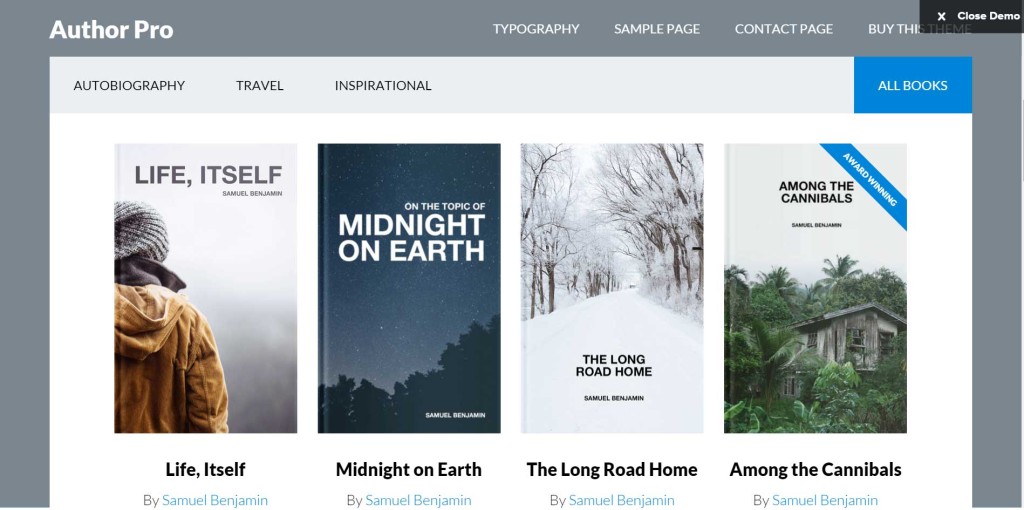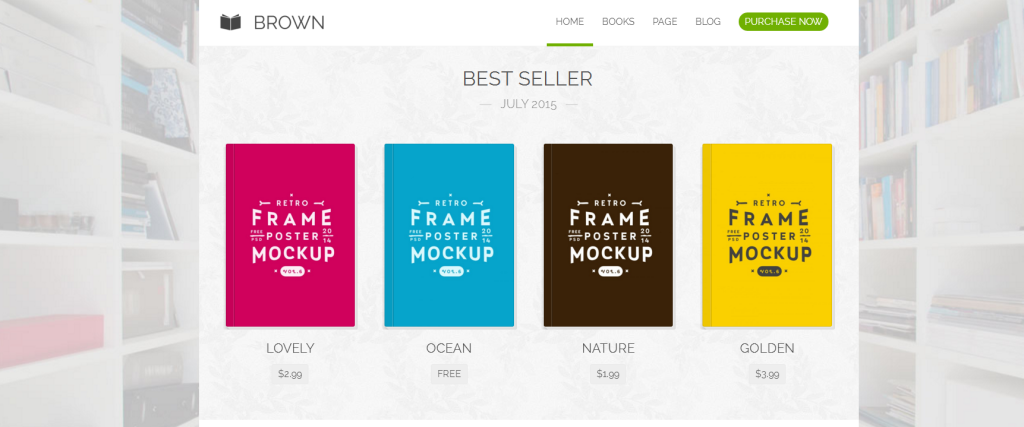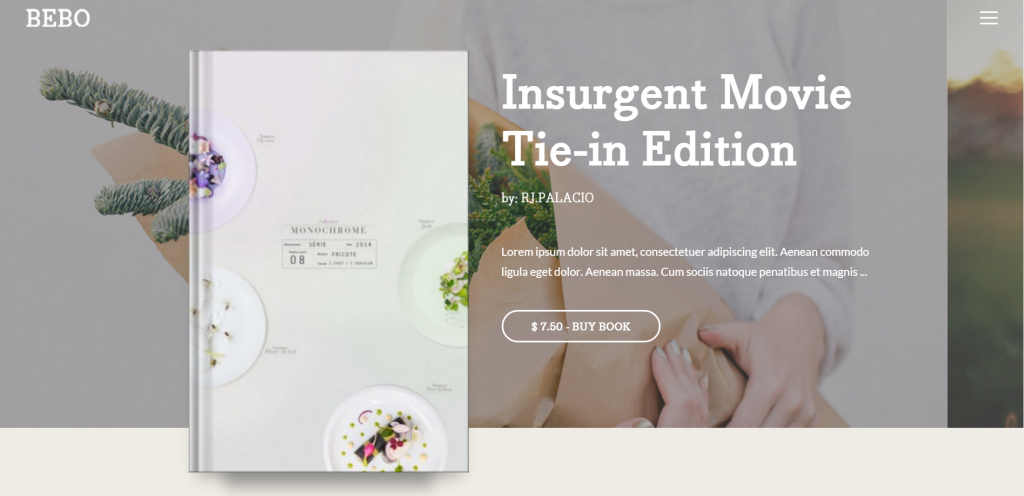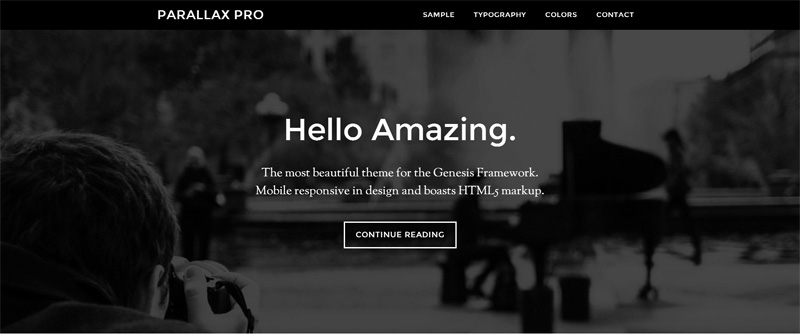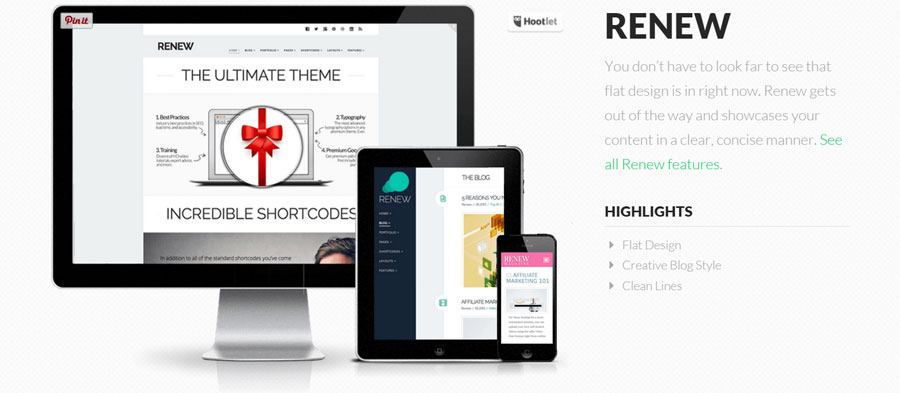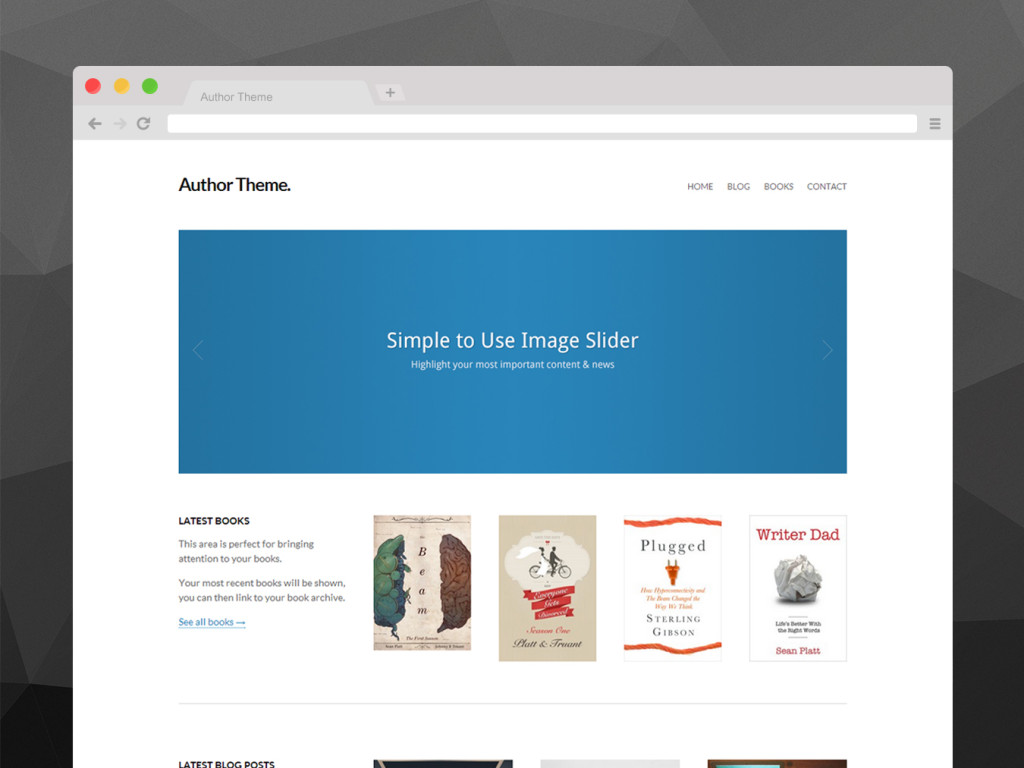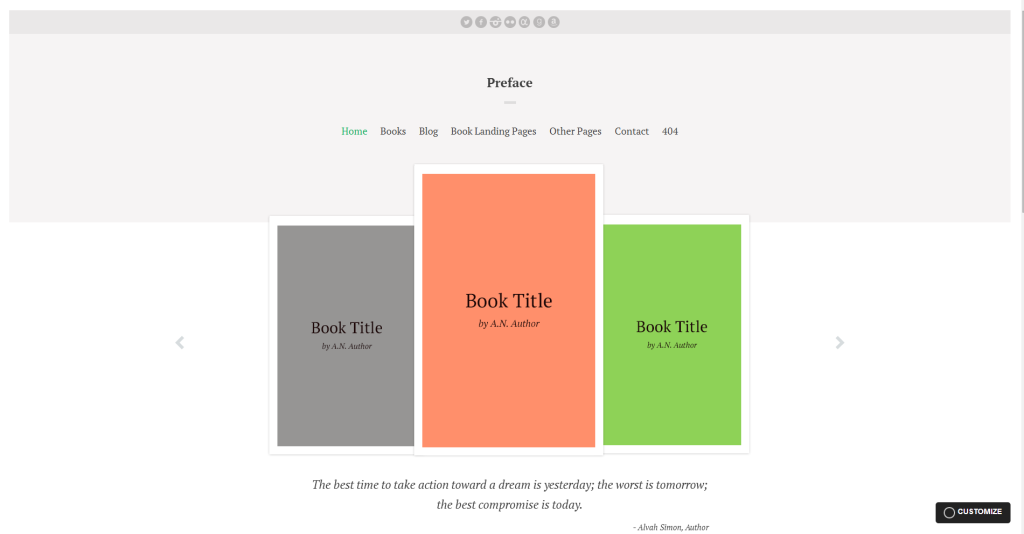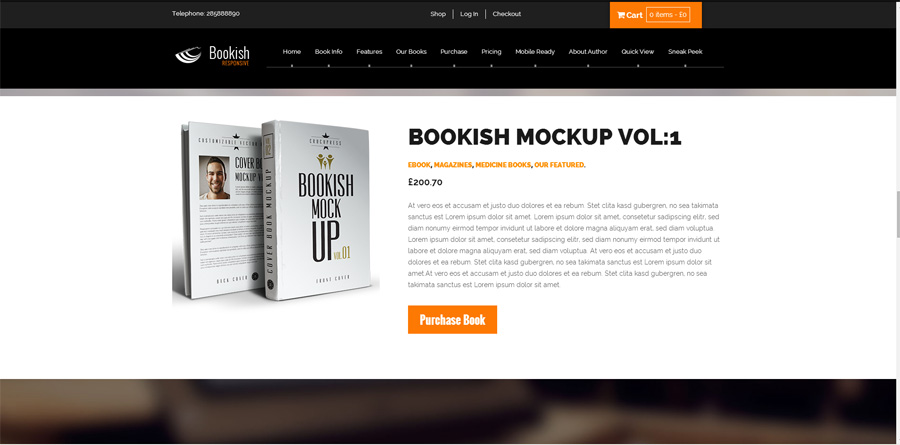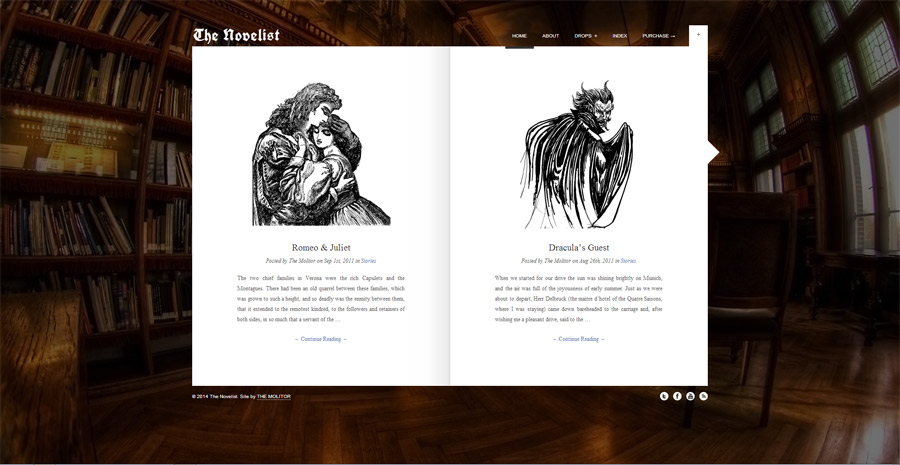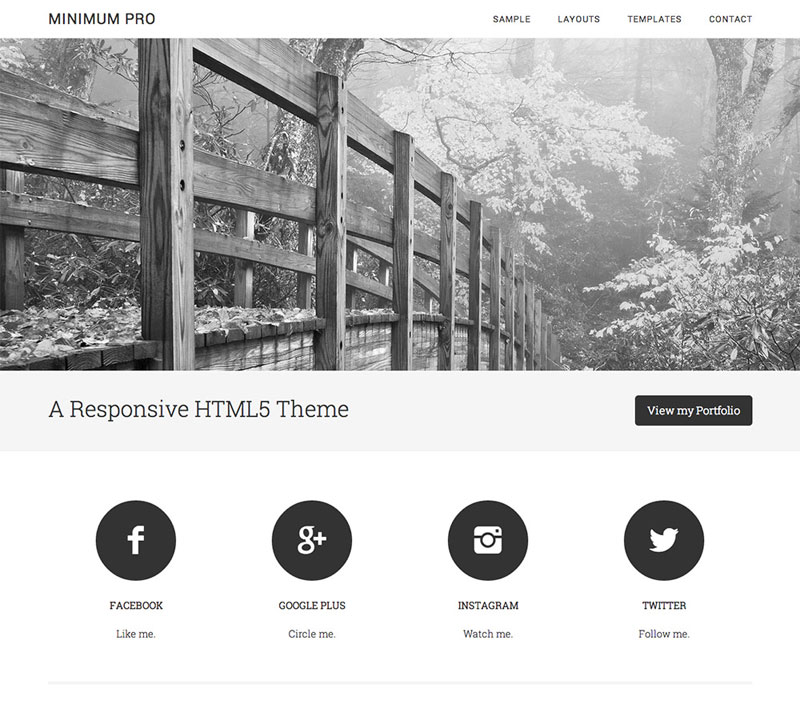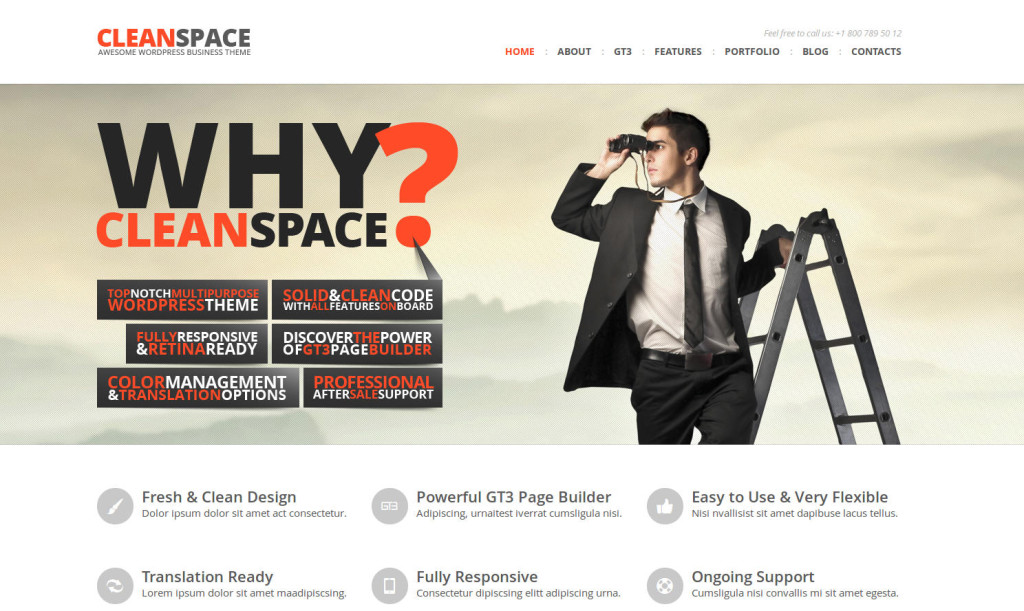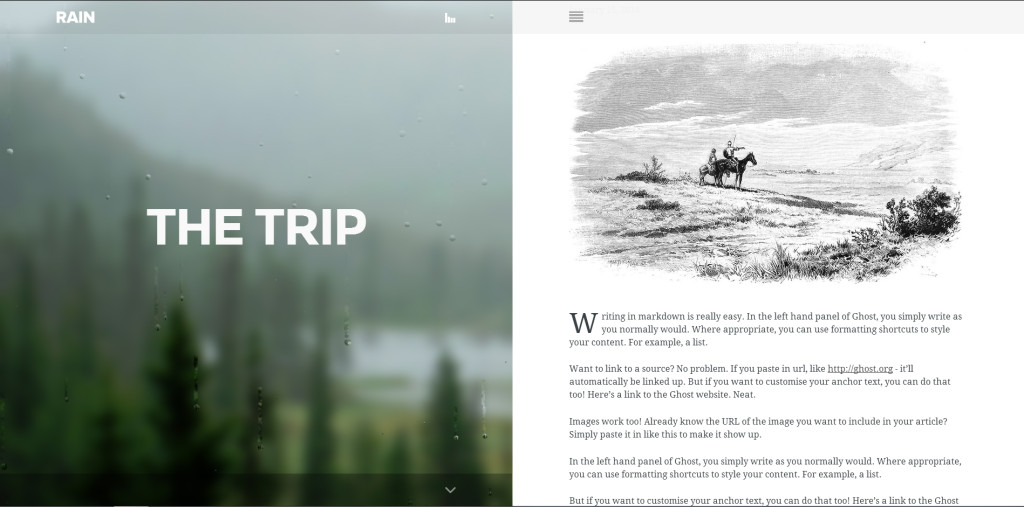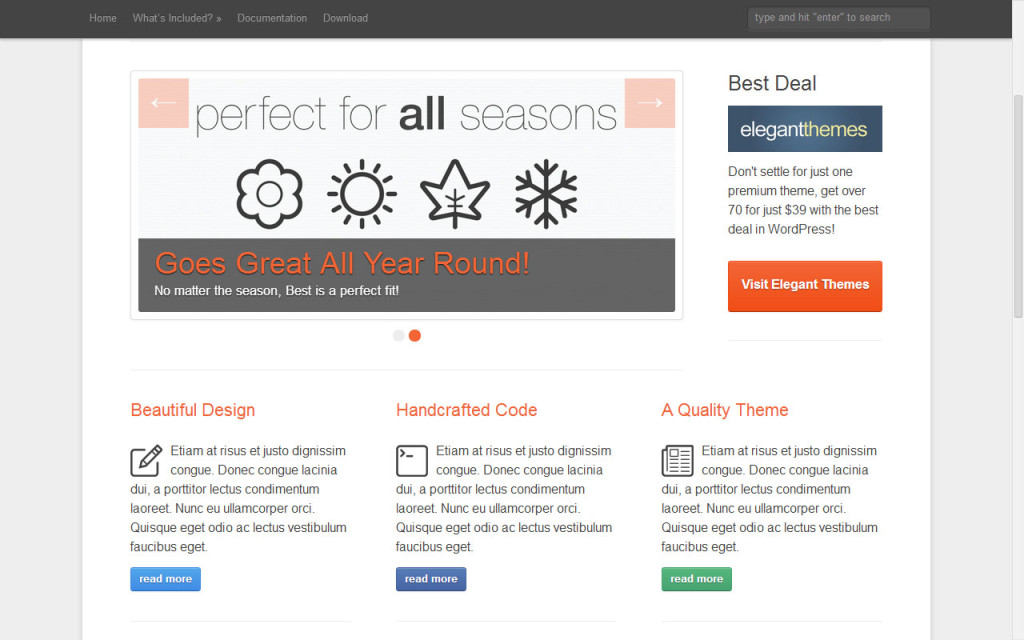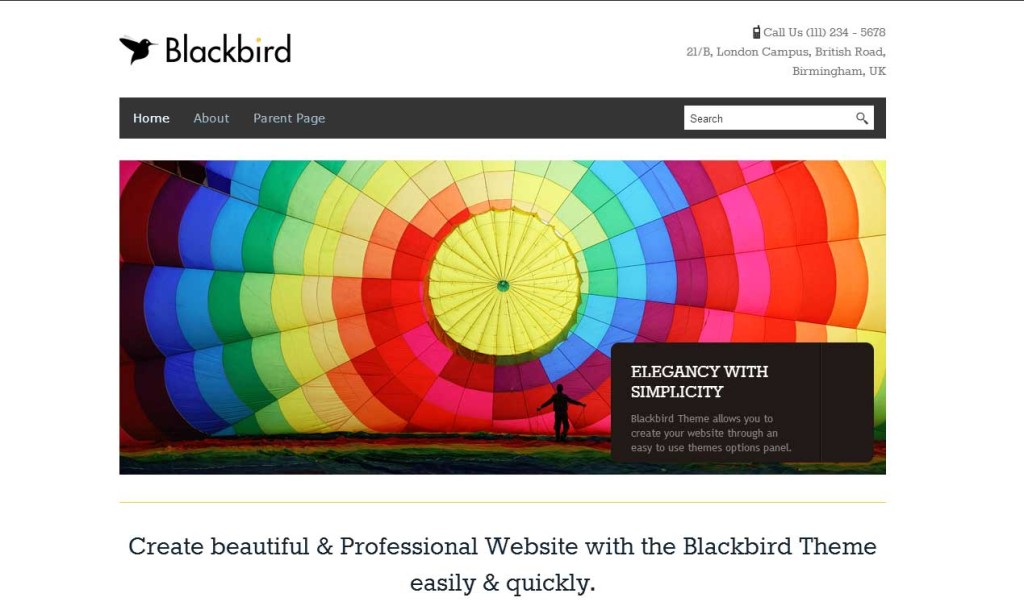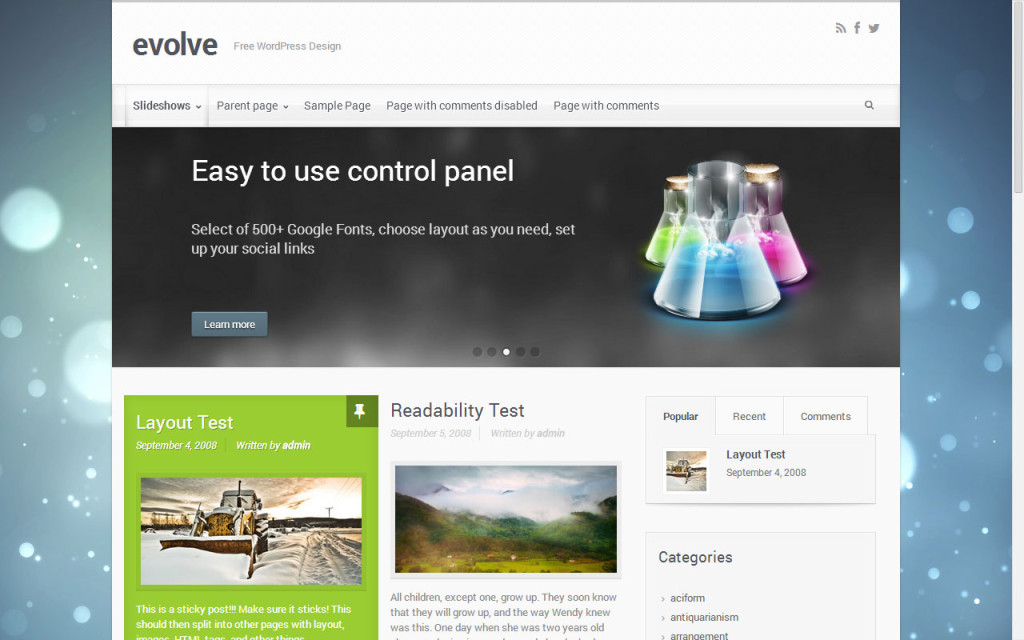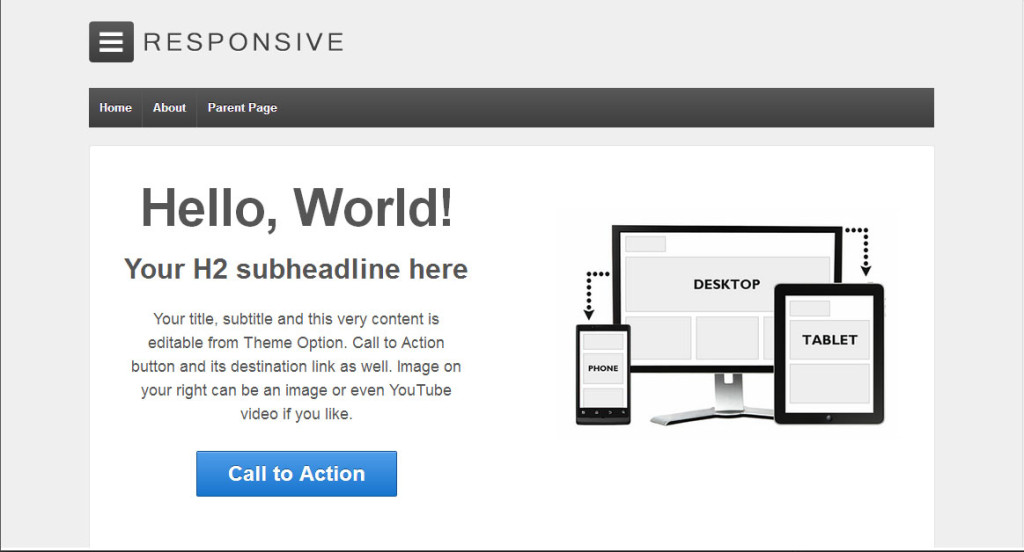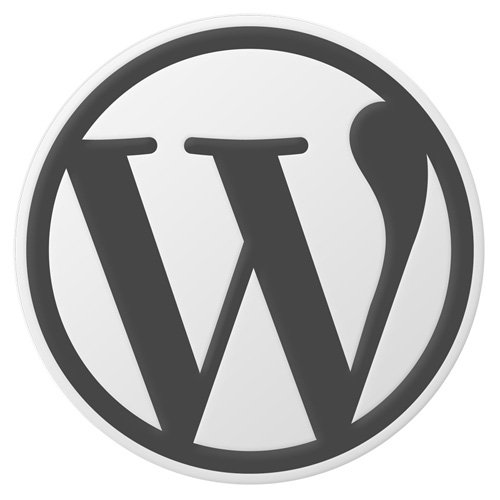WordPress themes for writers and authors
There are a lot of beautiful WordPress themes for writers and authors in the wild. Here’s a list to help you cut through the chaff. I’m confident you’ll find a theme for your book on this page.
Remember, we all want to sell books with our site. So choose a theme that shows off the cover, book excerpts and basic book info. Without distraction. I chose the themes below because they all do this well.
Click here to get the theme that I use…DIVI!
WordPress themes for writers and authors
1. Author Pro Theme
Sometimes it’s easy to recommend a new WordPress theme for writers and authors. You see it and you just know that the designer is also an author and understands the challenges involved with having a good site. The Author Pro Theme is just such a theme.
The theme includes all of the fundamentals, such as mobile responsive functionality (to make it look good on mobile devices) and hefty customization. But it stands out on two fronts:
1) A Landing Page feature that comes in handy when you want a no-distractions page for selling your book.
2) The $100 also includes the Genesis framework, which is a series of WordPress-compatible features like SEO tools and security. You also get personal support. From experience, I can tell you that Studiopress’ hand-holding is the best I’ve ever come across. If you don’t like to spend hours messing with plug-ins and code then the premium price is worth it.
Oh, wait a third benefit is the Author Pro plug-in which allows authors to easily add books to their sites. The books can display custom information, such as ISBN, description, price, publisher, and editor. This helps give the site a cohesiveness that any author who wants to sell books directly to the reader will want to have.
Download Author Pro Theme
2. Brown
This theme has the worst name of any theme ever created (ever-ever!) but it also enjoys serious breadth. It stands out for its focus on simple layout and fast navigation from book to book and the books’ content. Clicking on a cover gives the customer a chance to read some excerpts. Other benefits of the theme include:
- Responsive (looks nice on all devices)
- Good support
- Speed! Just be sure to optimize your images. No 1 megabyte pics allowed… ;-)
Download the Brown theme here
3. BEBO Author Landing Page
This WordPress theme for writers and authors stands out for its slick design and a couple of cool features that you don’t find everywhere.
- A timer widget. This lets you run a timed promotion on your site. These are available as a plug-in for your WordPress site, but it’s cool that the feature is built in.
- Three styles. All of them are nice looking too.
Other features include mobile-friendly design, video and an attractive master slider that will give you a chance to highlight your book cover.
Download the BEBO WordPress theme for authors here
4. Parallax Pro
Parallax sites are those sites where scrolling down adds nifty animations like sliding, fades, color changes, etc. It’s a cool trick and people still go nuts for a good Parallax site. The best one I’ve seen as far as simplicity and extension is Parallax Pro. It’s on the pricier side, but the hundred bucks includes the Genesis Framework, which allows for easier updating and editing when it’s time to make changes to the site.
Highlighted features (in addition to the Gensis Framework) are Landing Pages (necessary for your books and for promotions like newsletter sign-ups), HTML 5 markup and fully mobile-friendly.
Parallax Pro Theme
5. X | The Theme
X | The Theme is a catch-all kind of theme, promising a full suite of tools for everyone. This is especially true when you consider the fact that X is actually a suite of themes, not just one. Yup, the developer has crafted a single package with multiple designs, one of which will likely fit your needs. X also comes with a suite of free tools (like Mailchimp integration). This saves time and heartache caused by third-party plug-ins.
Here’s a list of features:
- WooCommerce integration
- Extensive styling options
- SEO optimization with 2015 ideas
- Shortcodes
- Responsive
- Disqus or Facebook comments extension
- Free Soliloquy slider
Download X | The Theme here
6. Author Theme for Writers
If simplicity and focus is your thing (and it should be) then you’ll need to consider this WordPress theme for writers and authors. The layout is simple, the slider is an unbloated, straight-forward thing and the product pages have almost everything you need. The one missing feature is a way to read a sample.
Highlights from the features list are:
- Easy to use Options Panel
- Premium Documentation & Support
- Built in Slider
- Custom Background Image/Color
- Custom Button & Link Colors
- Custom Logo Upload
- Custom Reviews Shortcode (I like this idea!)
- Book Page Templates (YAY!)
- Google Font Integration
Get Author Theme for WordPress here
7. Preface: A WordPress Theme for Writers and Authors
The thing I love the most about this theme is its simplicity. One of my main rules for a good book site is an elegant, FAST first impression. Preface does that well. Moving between pages is like lightning. And each page shares a look and feel that makes it easy for me to see what the author wants me to see. If I had to guess which theme was written by an actual author, it’s Preface. The list of features bears that out:
- Book categorization
- Book Launch Landing template! (FINALLY!)
- Book Filter template (Useful for large libraries)
- Showcase your books from your 404 Page (Clever. Essential.)
Get Preface: A WordPress Theme for Authors here
8. Bookish
One of the details that set this theme apart is the parallax design. “Parallax” is the style that you see on some sites where the background image scrolls at a different speed than the image in the foreground. It’s a fun effect that can be used to guide the customer through your content.
The theme also touts the following features:
- Works on mobile devices
- WooCommerce compatible (to sell your own books)
- Google fonts
- Dark & White Layouts
- Infinite Color Schemes
- jQuery enhanced slider and effects.
- Well commented code.
I read through the comments by users. There have been several bugs that have taken a while to fix. Bugs are common, but watch the discussion to see if the response time improves. Devs must support their themes, no matter how noisy (and annoying) customers get! If the outstanding bugs don’t appear to impact your goals, then consider the Bookish theme.
Get Bookish here
9. The Novelist: Responsive WordPress Theme for Writers and Authors
This theme is for those of you who lean heavily on excerpts to sell books. There aren’t a lot of page types (like in the Preface theme above) but it is a theme that lets you hone in on the work you do. Stumbling on a site that looks like an open book immediately tells the reader that they’re in the right place.
Among the features that the theme touts (beyond the bookish design) are Responsive design (to look good on mobile devices), support for the beautiful Google Fonts library and customized backdrops.
The theme has great ratings and folks seem happy with the FREE support.
The Novelist: Responsive WordPress Theme for Writers
10. Minimum Pro
This theme offers:
- Custom backgrounds and headers
- Mobile-readiness
- Threaded comments.
The $100 includes Copyblogger’s Genesis framework. Genesis is a toolset that makes the site easier to customize. It’s a good thing to have when you’re building a new website and still in design/self-education mode. Genesis adds features like:
- One/two/three column pages.
- Left/right sidebars.
- Fixed-width, for when you don’t want tech messing with your content.
- Custom headers/menus.
Why could this theme steal my business away from Cleanspace? It’s good looking, expandable, updated often, and it’s made by the Copyblogger folks who simply make excellent products with fast support. As I add more book series to my roster I’m positive that my website needs will change. If they do, I have my eyes on Minimum Pro.
Check out the Minimum Pro WordPress theme here
11. Cleanspace Business Theme.
I used this theme for years. It does a number of things well.
First, it looks great out of the box. I’d have to work really hard to make it ugly. And, believe me, I’ve tried.
Second, it includes a number of visual features that I like, including a huge slider that displays large images across the width of my site. The sliding animations that I’ve made with the tool are incredible. You can check out the slider on my homepage (note that I do turn it off sometimes, so I can’t promise it’ll be there).
Third, I chose my theme because it’s a premium theme. I want the support that comes with premium purchases. I’m not too happy with the help I’ve received from the developer, but the community is helpful. I’ve run with Cleanspace for several months without a hitch. Fingers crossed, but I think I chose a winner.
But one theme that always threatened to steal me away from Cleanspace is the next one on the list…
Download Cleanspace here
12. Rain WordPress Theme for Writers and Authors
If you’re looking for a WordPress theme for writers and authors that presents your content elegantly, check out Rain. It’s perfect for a site that is just for one book. You can upload an image of your choice and it appears fogged on the left side of the screen. You could put an image on the site that hints at a place or event in your story. Cool! The writing is presented in a simple, clean way (with Google Font support) and scrolling up/down from one page to another is lovely.
I could do without the ability to play an ambient audio file, but to each his own. The site owner can turn the audio off.
Benefits of the theme include:
- Designed and built by Elite developer. The boards have happy people and a load of comments by the creator.
- Responsive (for mobile devices)
- Table of Contents screen allows you to string together your content in a way that’s familiar to readers.
Beware of one thing. Widgets are not supported, which makes sense. You wouldn’t want to soil the sweet design with widgets, right?
Get Rain
13. Best
The simple Best theme includes:
- Responsive design (meaning it will look good on mobile devices).
- 3 page templates.
- Multiple menu types.
- Multiple page layout options.
- Header/logo uploader.
- Color options.
- Change site background.
- Shortcodes.
Best is a simple theme, with a simple blog-like layout. It would work nicely for writers who plan to do more blogging than selling. If selling is important to you, though, you can skip to the next one.
Download Best here
14. Blackbird
This is one of those solid themes that just look professional. Its features are pretty impressive, too.
Includes (from their site):
- 10 Different Color Skins, WordPress Themes to get Site Ready in 1 Click.
- Individual Page/Post Customization – Change various layout options on each individual page (or globally if you want).
- Dropdown Menus – Unlimited levels.
- Mobile-ready.
- Extensive documentation.
I do love the colors they make available. And you can switch between colors with a single click. When I used this theme I considered making a contest where I’d change the color once per week on Sunday; anyone who could tell me what the colors had been on my site the previous week would win a prize. I didn’t get around to doing it. But you could ;-)
Download Blackbird theme here
15. Evolve
I used this theme for about six months and was very happy with it. I somehow corrupted the site install one fateful evening, which made me look around for new themes. That’s when I ran into Cleanspace and we fell in love. But Evolve is a very competent free theme that I recommend to anyone who’s building an author site.
Benefits of the theme include:
- Ready for mobile technologies.
- Single blog post or blog grid layouts on the home page.
- Slideshows.
- Unlimited colors.
- Over 500 Google Web Fonts.
That last feature is a beauty. Google web fonts allow you to play around with type design on your site, which can be important to standing out in a crowded field and getting the important points across. Make sure you get a second opinion on how the site looks before you play around with fonts too much. It’s easy to get carried away and make your page look blechy.
Download the Evolve WordPress theme here
16. Themia
This theme is similar to my own in that it offers a wide slider at the top that can dominate the screen. I like that look because it lets me highlight what I want without having to think too hard. All I have to do is upload an image, make a call to action and I KNOW that everyone will see it, because they literally cannot miss it.
I also like Themia for its full width/product pages and easy-to-read buttons.
Here’s a useful tutorial that will help you decide if it’s the theme for you:
Download the Themia WordPress theme here
17. Responsive
Responsive is another simple, free theme that I used for several months. It has a good rep for support even though it’s free. Nothing is more valuable to someone just starting out, with limited time to futz around with webbie doohickeys.
Some highlights of the theme include:
- Adapts your website to mobile devices and the desktop or any other viewing environment.
- 9 Page Templates, 11 Widget Areas, 6 Template Layout.
- Easy Logo Upload, Social Networking and Webmaster Tools (we’ll discuss this in the plug-ins post later).
- Responsive is WooCommerce Compatible (important if you want to sell books directly, we’ll also discuss this in the plug-ins post).
- Multilingual Ready.
- Search Engine Friendly.
A great starter theme! It’s where I started ;-)
Download Responsive here
NOTE: Some links are affiliate links. The themes I’ve tried before are noted and highly recommended. The rest of the themes look fantastic and have shining support according to the theme comments.
You might also like:
WordPress for authors and writers (part three)
WordPress for authors and writers (part two)
WordPress for authors and writers (part one)

